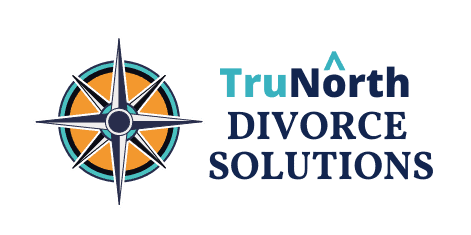At TruNorth Divorce, we believe there’s a middle ground: Enhanced Mediation. This model is led by a mediator who is also a Certified Divorce Financial Analyst (CDFA) and trained divorce coach. Enhanced Mediation gives couples the privacy and affordability of mediation with the added financial clarity and emotional support most mediators cannot provide.
So how do you know which path is right for your situation? Let’s explore 10 common red flags and see how each process—basic mediation, Enhanced Mediation, and collaborative divorce—addresses them.
🚩 1. One Spouse Lacks Financial Confidence
- Basic Mediation: Neutral facilitation only; no financial education.
- Enhanced Mediation: Financial education and clarity built in with a CDFA mediator.
- Collaborative: Financial neutral works with both spouses and attorneys to ensure informed decision-making.
🚩 2. One Spouse Tends to Dominate Conversations
- Basic Mediation: Risk of imbalance if one spouse overpowers.
- Enhanced Mediation: Coaching skills help balance communication and empower quieter voices.
- Collaborative: Attorneys and coaches advocate and manage communication in a team setting.
🚩 3. There’s Financial Complexity (Business, Retirement, Property, Support)
- Basic Mediation: Complex details may be overlooked.
- Enhanced Mediation: CDFA mediator can model scenarios, explain tax impacts, and guide financial choices.
- Collaborative: Financial neutral integrates with legal and emotional professionals to design durable solutions.
🚩 4. One Spouse Is Emotionally Behind the Other
- Basic Mediation: Emotional readiness is assumed.
- Enhanced Mediation: Divorce coach training supports emotional pacing and readiness.
- Collaborative: Coaches provide ongoing support to each spouse.
🚩 5. Risk of Hidden Assets or Financial Secrecy
- Basic Mediation: Relies on voluntary disclosure.
- Enhanced Mediation: Financial expertise helps spot inconsistencies and request follow-up documentation.
- Collaborative: Legal agreements require full disclosure; financial neutral reviews all data.
🚩 6. High Conflict or Poor Communication
- Basic Mediation: Sessions may stall due to conflict.
- Enhanced Mediation: Coaching techniques manage conflict and keep dialogue productive.
- Collaborative: Team coach provides structure for high-conflict dynamics.
🚩 7. Parenting and Custody Disagreements
- Basic Mediation: Parents may struggle to reach resolution without support.
- Enhanced Mediation: Can help with communication around children, but complex custody disputes may require additional professional support beyond TruNorth’s scope.
- Collaborative: Child specialists can be included to build a child-centered plan.
🚩 8. Manipulation or Gaslighting
- Basic Mediation: Mediator cannot advocate if one spouse uses manipulative tactics.
- Enhanced Mediation: Coaching skills identify unhealthy dynamics and redirect for fairness.
- Collaborative: Attorneys and coaches enforce accountability and balance.
🚩 9. Desire for Legal Advice During Negotiations
- Basic Mediation: Mediators cannot provide legal advice.
- Enhanced Mediation: Clients can consult attorneys between sessions while keeping costs manageable.
- Collaborative: Attorneys are present at the table, giving real-time legal advice.
🚩 10. Long-Term or Complex Spousal Support
- Basic Mediation: Settlements may be simplistic or unrealistic.
- Enhanced Mediation: CDFA insights ensure spousal support agreements consider taxes, budgets, and long-term needs.
- Collaborative: Financial neutral and attorneys collaborate to craft comprehensive support arrangements.
Summary Table: Choosing the Right Fit
| Situation | Basic Mediation | Enhanced Mediation | Collaborative Divorce |
| Low conflict, low complexity | ✅ | ✅ | — |
| Need financial clarity | ⚠️ | ✅ | ✅ |
| Emotional reactivity | ⚠️ | ✅ | ✅ |
| Power imbalance or trust issues | ⚠️ | ✅ | ✅ |
| Legal advice during meetings | ❌ | ⚠️ | ✅ |
| Complex finances | ⚠️ | ✅ | ✅ |
| Complex custody disputes | ⚠️ | ⚠️ | ✅ |
| Full accountability | ❌ | ⚠️ | ✅ |
✅ = Appropriate
⚠️ = May need added support
❌ = Not recommended
Final Thought
“Basic mediation works for simple cases. Collaborative works when things are complex. But TruNorth’s Enhanced Mediation often provides the best balance for most couples—especially when financial clarity and emotional support are key”
At TruNorth Divorce, we believe couples deserve clarity, fairness, and dignity—without unnecessary cost or conflict. Enhanced Mediation blends financial expertise and coaching support into the mediation process, creating a safe, informed, and efficient path forward.
Ready to explore your options?
Schedule a consultation with TruNorth Divorce and discover whether TruNorth’s Enhanced Mediation is right for you.

